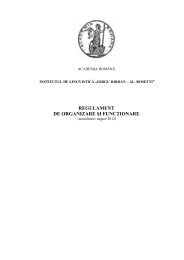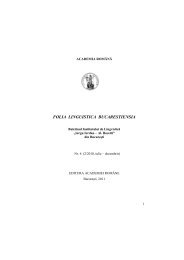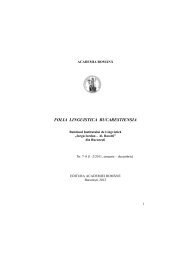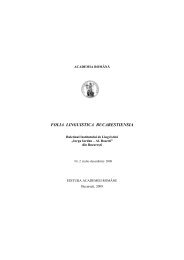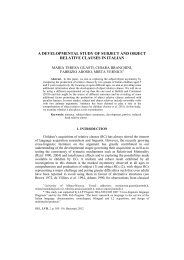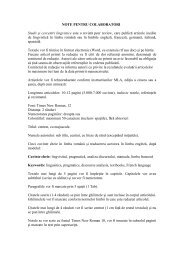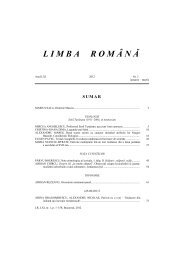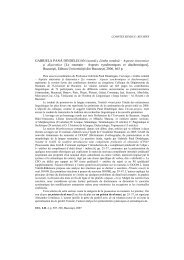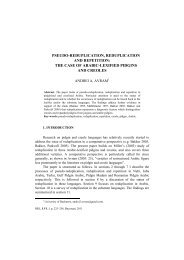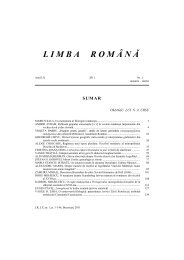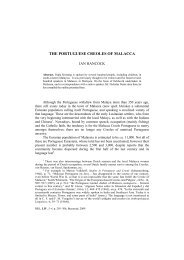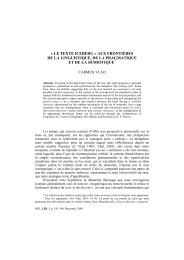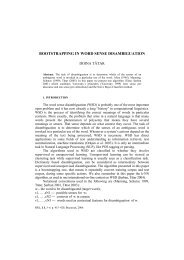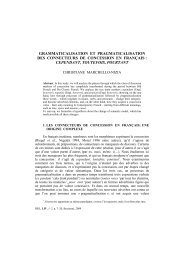'NOTHING' OR 'ANYTHING': TERMS IN IRISH AND SCOTTISH ...
'NOTHING' OR 'ANYTHING': TERMS IN IRISH AND SCOTTISH ...
'NOTHING' OR 'ANYTHING': TERMS IN IRISH AND SCOTTISH ...
Create successful ePaper yourself
Turn your PDF publications into a flip-book with our unique Google optimized e-Paper software.
210Seosamh Watson 6Scotland, since there is an instance recorded in an eastern dialect (Dorian 1978:101) in the phrase cha d’ith mi pic [sic] ‘didn’t eat anything’.2.5.2. bit: unrecorded in LASID but well-known from other sources, are anumber of further terms which should be mentioned. Some of these are fairlyrestricted in distribution and a few are English loanwords. The first of these, aborrowing from English bit, appears in a number of Scottish dialects, cf.Wentworth (2003: 26).2.6. fríd: ‘tiny amount, trace’, cf. Ó Dónaill (1977: 581) fríd an gháire ‘faintsmile’, lit. ‘trace of the smile’. This form, whose alternative and original meaningwas a ‘flesh-worm’, is mainly found in the gen. as a qualifier of some of the otherterms cited here, cf. 3.2, 6.4.1, so as to denote a still smaller amount. However, itdoes also occur independently with oiread ‘amount’ in the phrase oiread na fríde‘the amount of a mite, cf. McKenna (1935: 893) and Ó Dónaill (1977: 581). Thecorresponding Early Irish form of the word is frigit ‘flesh-worm’ for whichMacBain (1982: 181) would propose a connection with the same IE root asEnglish wriggle.2.7.1. giob: a similar usage noted for the south and west by McKenna (1935:108) involves this word in the sense of ‘[not a] stitch of clothes’. The lexeme inquestion is related to gioball ‘rag’ and is probably to be referred to Early Irish gob‘beak’ (without etymology, but cf. Dan. gab ‘mouth’), hence a ‘shredded item’.2.7.2. luid: within the same semantic field lies a word recorded by bothMcKenna (1935: 108) in the sense of ‘nothing’ with reference to ‘money, clothesetc’ and also by Lane (1922: 1088) in the expression oiread na luide (lit. ‘theamount of nothing’) referring to clothing. Luid appears to be the word whichsignifies, both in Irish and Scottish Gaelic, a ‘rag’. Its etymology seems bestregarded at present as undemonstrated, since MacBain’s (1982: 236) suggestionslinking it to the same root as Gk λύω etc do not appear to be substantiated.2.8. heat: this term is recorded for a north-western Scottish dialect byWentworth (2003: 27). Its usage appears to be in the context of ‘not achievinganything’. The word in question is known to be Scots, cf. DSL (: s.v. haet) andoriginates in the substantivisation of the verbal phrase ha’ it, abbreviated from([Let] the Devil) have it! It is, thus, comparable in origin and development toEnglish damn ‘nothing’, cf. damn it! > a damned thing > a damn!2.9.1. pingin: Early Irish pinginn, is a borrowing from Old English penning,English penny, cf. LEIA (: P-9). The term in this case, as noted from a Connacht



